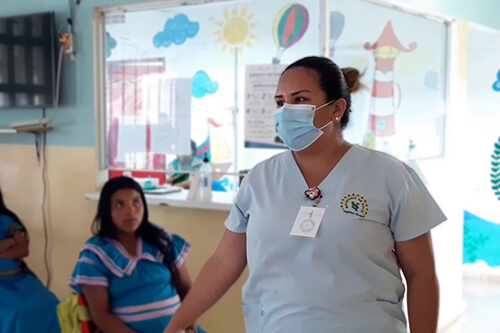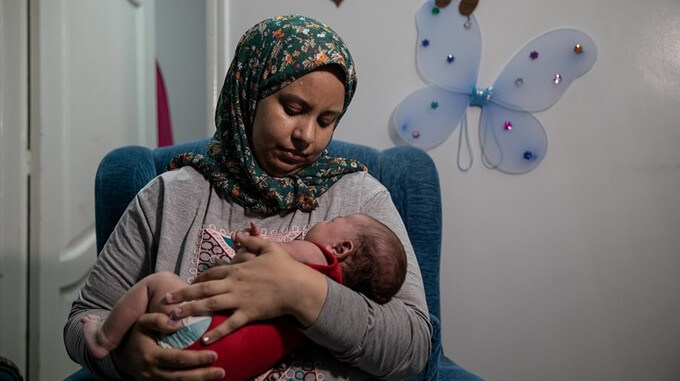
The COVID-19 pandemic has further demonstrated that access to healthcare – and the impact of health crises – is different for everyone. During this unprecedented crisis, existing gaps in access have become even worse.
The pandemic has affected marginalized communities of color at a disproportionate rate, in part due to limited access to quality care. Refugee communities are on lockdown and don’t have access to soap or the opportunity of social distancing. The elderly and people with disabilities also face their own unique obstacles to care during the pandemic.
Additionally, the coronavirus isn’t the only issue people are facing. Experts warn of a “shadow” pandemic, particularly referring to the rise in violence against women during the COVID-19 crisis.
Extreme disparities in healthcare are also rooted in pre-existing gender inequalities. Crisis situations exacerbate these inequalities, putting the lives of women and girls further at risk.
At all times, and especially during the COVID-19 pandemic, access to healthcare is not equal between genders. That inequity increases vulnerability. Women and girls are often without crucial, lifesaving care when they need it most, such as during childbirth.
Women on the frontlines
Due to the composition of the public health industry, women are subject to greater exposure to COVID-19 than men. In fact, 70 percent of health and social workers around the world are women. These are midwives, nurses, doctors, and community health workers that go without crucial personal protective equipment (PPE) to keep themselves and their families safe. Further, mothers, grandmothers, daughters, and aunts take on the brunt of sick care the home. Even when women are not paid to care for an infected person, they are at increased risk of contraction and complications from the virus.

With health systems overburdened and global supply chains impacted by COVID-19, hospitals and clinics are seeing shortages of PPE, ventilators, beds and other crucial lifesaving supplies. Each day, we hear about more doctors and nurses becoming sick.
Long days, emotional trauma, and gender-based violence at home affect many women in the workforce. It’s crucial that psychosocial support and supplies are given to hospitals and clinics so women can continue working to save their community.
Women at home
Stay-at-home orders and quarantine protocols are forcing families to work from home. Now, UNFPA is seeing a rise in gender-based and domestic violence as tensions in the household increase.
At the same time that women are less able to seek external help and are trapped inside with their abusers, health systems that protect women and girls are overburdened with COVID-19 cases and do not have adequate capacity to reach out to women and girls. This leaves survivors of gender-based violence especially vulnerable during the pandemic.
At home, domestic work generally falls on women and girls. This domestic burden, which is likely to have increased due to the pandemic, in addition to their own professional work load can lead to high stress.
UNFPA is asking men to help their wives, mothers, and daughters with chores and family obligations during this time!
Maternal health is overlooked

In crisis settings, reproductive health issues and gender-based violence are often overlooked in lieu of basic needs like food and water. For the COVID-19 pandemic, face masks and hand sanitizer remain the priority, which means that crucial services to protect women and girls are being delayed.
Overlooking maternal health during the pandemic is resulting in a rise of maternal and newborn mortality, increased unmet need for family planning, and increased number of unsafe abortions and sexually transmitted infections.
Skilled healthcare professionals like midwives are needed for women to have safe pregnancies and deliveries. But when women aren’t able to reach health facilities because of lockdown procedures, they find themselves at higher risk of pregnancy complications.
Even if women are able to reach a midwife in a timely manner, many health facilities are overburdened by COVID-19 cases and may not have the space or right equipment to support maternal health. That is why it is incredibly important for everyday people to continue wearing masks and washing their hands, so that COVID-19 cases do not rise and overwhelm hospitals and clinics.
Women do not stop getting pregnant, even during pandemics.
Women have a right to timely, quality care no matter the situation.
Studies show that pregnant women are more at risk of adverse outcomes if they contract respiratory illnesses like COVID-19. Some pregnant women are afraid to go to hospitals for care because they fear bringing the virus back home or making their babies sick.
UNFPA recommends that pregnant women are treated with the utmost priority and that antenatal, neonatal and maternal health units are segregated from COVID-19 patients. But this may not be possible as long as supply chains continue to impact reproductive health services due to the pandemic.

Even more important is the need for community programs to educate pregnant women and new mothers on safety precautions during a pandemic. With the right knowledge, a new mom can secure the health of her family, baby, and herself.
UNFPA has been engaging with communities in Panama and Bangladesh, for instance, to teach women and families practices to best protect themselves from COVID-19. This education is crucial to reduce the risk of contracting the coronavirus, and also gives women and girls a sense of agency and support in their community.
Looking ahead
UNFPA projects a rise in harmful practices against women during the pandemic. There’s already enough evidence to show that women are facing two pandemics – one of COVID-19 and another of violence. With women bearing outsized responsibility on the frontlines and at home, we need to ensure they have the right supplies and support to stay safe and protected.
UNFPA is working with communities all over the world to ensure that women and girls receive the timely, quality care.